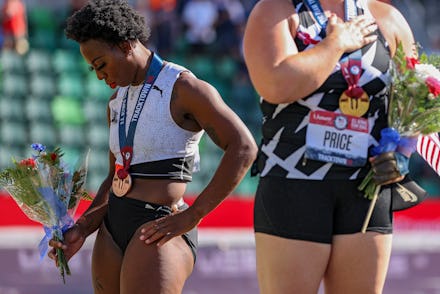Gwen Berry’s podium protest showed the Olympics are about more than sports

When the U.S. Olympic track and field trials kicked off in Eugene, Oregon, on June 24, hammer thrower Gwen Berry greeted the crowd and her competitors with a raised fist and a t-shirt reading "athlete activist."
"I just want everyone to understand that, as athletes, we can use our voice, we should use our voices to bring awareness to these issues that impact our communities," the 31-year-old told the AP. "Because our communities are the communities that are under attack."
On Saturday, June 26, Berry won a bronze medal and a ticket to Tokyo. But when the national anthem played as she stood on the podium, Berry took it as a personal affront. She turned away from the flag to face the stands, then draped her "athlete activist" tee over her head in protest.
To be clear, the Olympic trials didn't play "The Star Spangled Banner" during every medal ceremony. USA Track and Field told Reuters the song was played once each day at a scheduled time. On Saturday, evidently, it coincided with the hammer throw awards.
Berry didn't buy the explanation: "I feel like it was set up. I feel like they did that on purpose, and I was pissed, to be honest," she said, of being on the podium during the song. "They said they were going to play it before we walked out, then they played it when we were out there," Berry noted. "But I don't really want to talk about the anthem because that's not important. The anthem doesn't speak for me. It never has."
The Olympian also explained her decision to face away from the flag: "I was thinking about what I should do. Eventually I stayed there and I swayed, I put my shirt over my head," she said. "It really wasn't a message. I didn't really want to be up there. Like I said, it was a setup. I was hot, I was ready to take my pictures and get into some shade." Eugene hit a high of 103 degrees Fahrenheit on Saturday.
Berry has a track record of being outspoken about racial injustice. Two summers ago, after winning gold at the 2019 Pan-American Games in Lima, Peru, she raised a fist on the podium and was slapped with a yearlong probation for violating international rules that prohibit protests inside stadiums and during ceremonies. Berry said it cost her sponsors, including Nike. "For me, it was extremely devastating because they cut off all my revenue," she told CNN last year.
The organization Color of Change eventually stepped in to advocate for Berry, pressuring sponsors to support her so she could maintain a platform for her message. Puma backed her with a $15,000 paycheck, equipment and apparel, and a campaign called "She Moves Us." Puma also reps Tommie Smith, the track star who famously (or notoriously, depending who you ask) raised a fist at the 1968 Olympics.
In the wake of 2020's national racial reckoning, fueled by the police killing of George Floyd, the U.S. Olympic and Paralympic Committee (USOPC) said it would not sanction athletes who raise a fist or take a knee during the Olympic trials — meaning Berry won't be punished by American athletics. The same can't be said about the Tokyo Games. This spring, the International Olympic Committee (IOC) upheld its longstanding ban on athlete protests and said they'd take punitive action if — more likely when — competitors advocate for social justice in Japan this July.
Predictably, Berry's protest at the Olympic trials angered conservatives who equate patriotism with morality. For example, Texas Republican Ted Cruz demonstrated his selective comprehension of American history by tweeting: "Why does the Left hate America? Sure, we have our faults, but no nation in the history of the world has liberated more people from captivity, has lifted more out of poverty, has bled more for freedom, or has blessed more w/ abundance."
In response to the deluge of accusations that she's "un-American," Berry had an incisive, two-part reply. "These comments really show that: 1.) people in America [value] patriotism over basic morality 2.) Even after the murder of George Floyd and so many others; the commercials, statements, and phony sentiments regarding black lives were just a hoax," she tweeted.
There's the looming threat Berry could be punished if she protests racism on a global stage, but the athlete and mother explained that her message is more important than her career. "My purpose and my mission is bigger than sports," she said. "I'm here to represent those [...] who died due to systemic racism. That's the important part. That's why I'm going. That's why I'm here today."
It's also why she doesn't sweat the competition: "I feel like being Black in America is enough pressure," Berry said. "The neighborhoods I grew up in is enough pressure. The things I have to deal with and I have to protect my son from is enough pressure. And I’m here. I’m old enough to be able to handle a lot of this pressure."